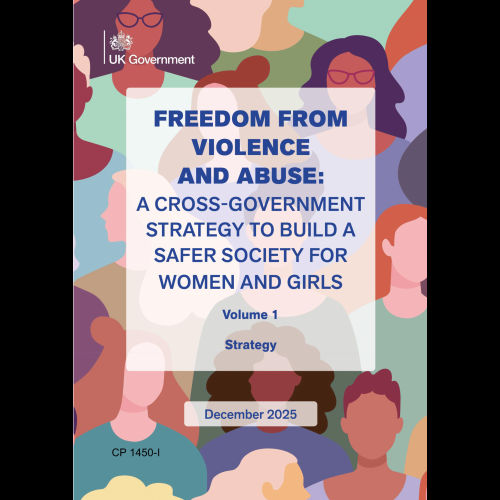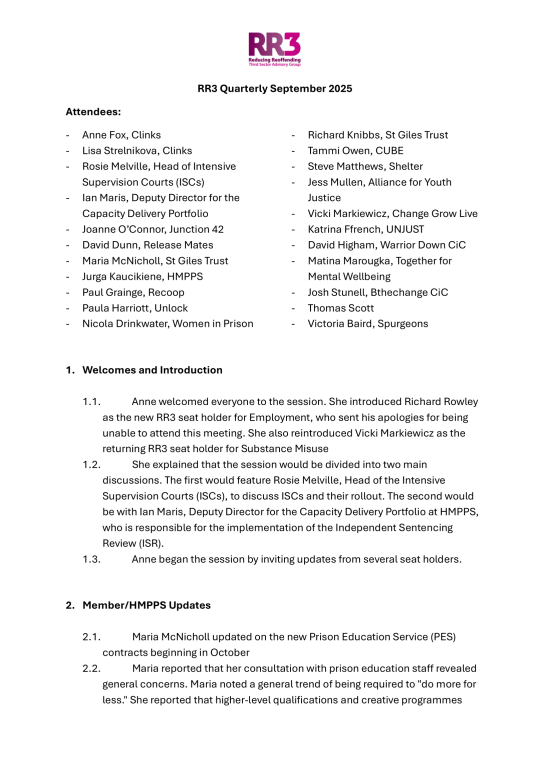On 7th December, the Ministry of Justice (MoJ) published the Prisons Strategy White Paper. White papers are policy documents produced by the government that set out its proposals for future legislation. This one sets out proposals for future changes to the prison estate and prison regimes, many of which will have significant consequences for the way prisons are run over the next decade. Here we summarise some of the key points of Clinks’ response, informed by Clinks’ members and the wider voluntary sector working in criminal justice. Read our full response here.
The sector’s voice heard
We are pleased to see that the Prisons Strategy White Paper included consultation, providing an opportunity for voluntary sector experts to help shape this hugely important piece of work in defining the government’s long-term vision for prisons. This is especially welcome, given that the development of the white paper itself was not informed at all by consultation with the voluntary sector, something we raised with Victoria Atkins MP, Minister of State in November 2021.
Our response to this white paper has been informed by consultation with voluntary organisations working in the criminal justice system as well as our experience of supporting organisations working in prisons and delivering resettlement support.
Creating a better future for prisons
Although Clinks supports the improvement of the prison estate to raise standards of care and decency, we told the MoJ that we do not believe that the white paper provides a convincing case as to why the capacity of the prison system needs to increase by 20,000 places. Instead, the MoJ can reduce the use of prison and keep the public safe by investing in diversion (by police and at court), reducing those held on remand, limiting the use of short prison sentences for non-violent crimes, and decreasing the number of people recalled to prison. Clinks continues to advocate strongly that prison is a dead end and that any prison building should be delivered alongside the decommissioning of other prison places.
For those who are in prison however, a prison service must be more than just bricks and mortar. Space and regime go hand in hand and people’s lives are being transformed every day by the voluntary organisations working in our prisons. Despite the high volume of voluntary organisations working in prisons across England and Wales, the strategy barely mentions their contribution. In our response to the white paper, we recommend that the Ministry of Justice should commit resources to improve its partnership with the voluntary sector, including national engagement mechanisms, greater partnership with independent grant-making trusts and foundations, and the recruitment of voluntary sector coordinators in every prison.
Equality and fairness must be at the heart of prison strategy
There are aspects to welcome in the white paper in relation to how the prison service intends to better support women, such as a trauma-informed and trauma-responsive women’s estate and a re-stated commitment to reduce the number of women in prison. However, the Female Offender Strategy should be the driving force behind the approach to women, not this white paper. The Female Offender Strategy provides an evidence-based foundation and its desire to address women’s needs in the community through diversion or community sentences supported by specialist women-only services – rather than in an inadequate and geographically dispersed prison system – is the right strategy. The Ministry of Justice should therefore act on the National Audit Office’s recommendations to set clear goals, metrics, and governance to drive that strategy forward and resource it.
As stated in a letter to the Secretary of State for Justice – written by Khatuna Tsintsadze, Zahid Mubarek Trust and Dez Brown, Spark2Life – the white paper is a lost opportunity to address existing racial disparities in prisons. The prison strategy should be explicitly anti-racist and clearly set out how it will tackle the racial discrimination and disproportionality in the prison system. It should openly set out what it will do to monitor the outcomes for minoritised or racialised groups, what steps it will take to address any disparities in outcomes or experiences, and how it will ensure its staff and services can meet the diverse needs of people in prison.
Improving resettlement support
It is vital to improve support for people when they leave prison. We think the resettlement passport set out in the white paper could be of benefit, but only if the design is user-led and attention is paid to avoid duplicating current processes. We believe that co-produced sentence plans, shared digitally with the prison leaver, along with the provision of some necessities will be the most effective way to support rehabilitation.
The voluntary sector has long campaigned to end the practice of releasing people on a Friday, which leaves many people homeless and without enough money for the basics over the weekend. It’s therefore a huge victory for our members and partners that the MoJ commit in the white paper to explore ways to avoid Friday releases. In our response we advocate for a legislative approach that can provide a clear, robust, and straightforward process for prison governors to follow, that creates consistency and supports the system to work effectively.
Next steps
We look forward to the government’s response to its consultation on its white paper. We will work with the MoJ and HMPPS to harness the expertise of the voluntary sector in the delivery of many of its commitments in the strategy to improving the lives and prospects of people in prison, and to further ensure gaps in the strategy are addressed.
We have invited the White Paper team to attend the next quarterly Reducing Reoffending Third Sector Advisory Group meeting in March to provide us with a summary of the responses they have received and their planned next steps. The minutes from the meeting will be published on our website soon after. Subscribe to our Light Lunch email to get the latest in your inbox every Friday.
Photo: HMP Swansea, photographer: Andy Aitchison
What's new
Blogs
Violence Against Women and Girls (VAWG) Strategy Blog
Publications
Latest on X
The role is for a leader from an organisation focused on racially minoritised people, with expertise in service delivery, policy, advocacy, or related areas in criminal justice. Racial disparities are present at every CJS stage. This role ensures these voices are central in shaping policy to help address and eradicate them. Apply by Mon 18 Nov, 10am. More info: https://www.clinks.org/voluntary-community-sector/vacancies/15566 #CriminalJustice #RR3 #RacialEquity

